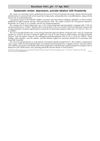 81 citations,
May 2007 in “Fertility and Sterility”
81 citations,
May 2007 in “Fertility and Sterility” Testosterone therapy seems safe for postmenopausal women for a few years, but more research is needed for long-term effects.
 100 citations,
July 2018 in “Journal of The American Academy of Dermatology”
100 citations,
July 2018 in “Journal of The American Academy of Dermatology” People with alopecia areata often have other health issues like skin diseases, metabolic syndrome, stomach infections, lupus, anemia, thyroid problems, mental health issues, vitamin D deficiency, and hearing and eye problems.
 137 citations,
June 2005 in “Climacteric”
137 citations,
June 2005 in “Climacteric” Estrogen loss during menopause worsens skin health, but hormone replacement therapy may improve it, though more research is needed.
 July 2024 in “Heart Lung and Circulation”
July 2024 in “Heart Lung and Circulation” There may be a link between hair loss and heart disease in women, but more research is needed.
 20 citations,
July 2000 in “PubMed”
20 citations,
July 2000 in “PubMed” The document outlines a method for diagnosing hair loss and suggests specific treatments based on the diagnosis.
 179 citations,
September 1998 in “BMJ”
179 citations,
September 1998 in “BMJ” Hair loss in men is common, treatable, but not curable.
 15 citations,
August 2017 in “Scientific Reports”
15 citations,
August 2017 in “Scientific Reports” Young men with early hair loss have slightly worse blood sugar and fat levels, suggesting possible health risks and need for monitoring.
 April 2021 in “Reactions Weekly”
April 2021 in “Reactions Weekly” Finasteride increases risk of depression, possibly suicidal thoughts, and sexual dysfunction.
October 2022 in “Journal of health sciences and medicine” Middle-aged and elderly men with BPH had higher hospitalization rates for COVID-19.
 1 citations,
July 2017 in “Journal der Deutschen Dermatologischen Gesellschaft”
1 citations,
July 2017 in “Journal der Deutschen Dermatologischen Gesellschaft” Topical caffeine improves hair loss intensity, speed, and shedding, and works better with minoxidil/azelaic acid.









